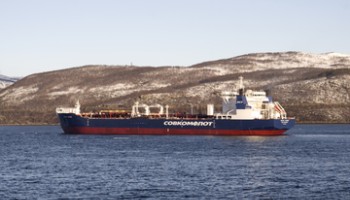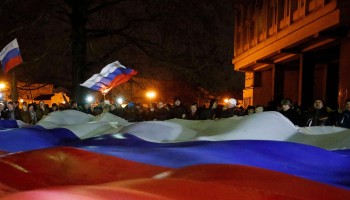Russian oil tankers have disabled their on-board automated identification systems (AIS) — in what is known as dark activity — in an attempt to circumvent international sanctions brought about by the country’s invasion of Ukraine.
Expert opinions warn that this development could potentially alter the manner in which maritime trade is conducted and enforced around the globe.
“We’re in a very rapid period of transition from how things were to how things will be,” Dr. Ian Ralby, Founder and CEO of I.R. Consilium, an American firm that specializes in maritime law and security, told OCCRP.
With Russia cut off from international markets, its commercial fleets may seek to augment sanctioned operations and resort to non-traditional payment methods, which would lay the foundations for an off the books economy, Ralby said.
Since Western buyers can no longer use conventional payment mechanisms with Russia’s shipping industry for fear of discovery, Ralby predicts that “we’re likely to see a rise in both cash payments and other non-traditional payment mechanisms, including cryptocurrency.”
And to add another layer of discretion, Ralby says that Russian-sanctioned entities could potentially operate under a different name or even a different flag in order to make it harder for authorities to trace their operations back home.
Meanwhile, for prospective new buyers, there is now an opportunity to establish a marriage of convenience with Russia where it did not exist before.
For instance, countries that are also heavily sanctioned by the West, like Iran and North Korea, now find themselves on more similar footing with Russia; they therefore benefit from a much lower risk-return ratio in doing business with each other.
“This is where I think we’re likely to see a parallel global economy of sanctioned states as well as what we have right now, which is the sort of legitimate and illegitimate global economies,” said Ralby. “We're likely to see an entire third ecosystem emerge.”
And as for non-sanctioned entities, a willingness to engage with sanctioned states such as Russia can be a lucrative opportunity that is well worth the risk, since the scrutiny and consequences that come from discovery can give buyers more leverage in negotiating favorable terms.
Essentially, “they can actually make more than they would in the legitimate economy by showing a willingness to partner and work with the economies that can’t work with everybody else,” Ralby told OCCRP.
Such enticements need not exclusively be offered in the shadows either, if the buyer is not bound by a particular country’s sanctions. Last month, Russia attempted to mitigate its crude oil losses with the West by offering discounts to India of as much as US$35 per barrel, according to Bloomberg.
White House press secretary Jen Psaki noted that while every country has “different economic reasoning” for accepting business with Russia, she stressed that “the rest of the world is watching where you’re going to stand as it relates to this conflict, whether its support for Russia in any form as they are illegally invading Ukraine.”
Like organized crime, dark activity is not localized in any single country, region, or body of water and Ralby suggests that efforts to counter it must therefore be just as fluid and interconnected.
“What we need to do is exercise greater global maritime domain awareness in terms of scrutinizing the global fleet, the movements, and activities of vessels all over the world,” he explained. “Because if we’re not watching globally, we’re likely to miss something.”






